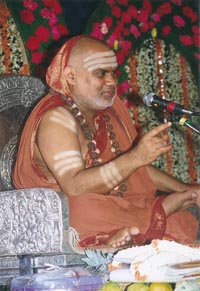| |
The True Import of the Vedas
|
|
Vedas are Ishwara’s revelation
Shankara Bhagavatpadal in the course of His short life span of 32 years achieved what others cannot even dream of. In His commentaries on the three principal sacred texts of the Hindus namely, the Upanishads, the Brahma Sutras and the Bhagavad Gita, He has expounded the true import of the scriptures.
We believe that God revealed the Vedas and that no man is their author. In the Tarka Sastra it is said, “Sabda is of two forms – worldly and Vedic. The worldly word uttered by a reliable one is a valid means of knowledge. With regard to the Vedic utterance everything is valid because it is taught by God.”
Surely no man could have been the author of the Vedas for therein we find, among other things, teachings pertaining to the means to attaining heaven. When one cannot know anything about heaven by non-scriptural means how could anyone have, by himself, described the means to attaining heaven? Further, if man wrote the Vedas then the Vedas could not be considered as valid because compositions of humans are not guaranteed to be free from defects.
Defects of human writings
The first of such defects is incorrect understanding. Due to incorrect understanding of the topic on which one is writing, errors may creep in. Another possible defect is that of faulty exposition. One may know well the subject on hand but may make mistakes when seeking to express what he knows. A third fault is the bad intention to mislead another. One may know the subject on hand and may be in a position to expound correctly, but may be possessed with a bad intention to mislead others. Hence knowingly one may write that which is not in consonance with what one knows to be correct. Yet another fault may be that which pertains to the senses of perception. For instance, a teacher may expound impeccably but if the disciple is hard of hearing then there are chances of the disciple grasping faultily. Such faults would constrain the validity of what is composed by man. The Vedas are fully free from defects since man did not author them. Indeed it is regarded as beginningless.
Import of the Veda
When someone expounds something we can ascertain the import of the teaching by getting clarification from the expounder. In the case of the Veda, such a facility is non-existent due to the absence of human authorship. How then is the true import of the Veda to be ascertained? The import of the Veda is ascertainable by considering the factors listed by the Mimamsakas (adepts in the study of the part of the Vedas concerning rituals).
The first of these is unity between what is declared at the commencement and what is declared in the conclusion. This, in fact should be the case with any good discourse also. In the Upanishads such as the Chandogya we find the scripture starting a portion declaring the nature of the Supreme and ending with the same topic. This test will show that the scripture is intent on expounding the non-dual Self.
The second test is repetition. That which is repeated often may be taken to indicate the purport. Sometimes, we find people repeating while lecturing for want of knowledge. Such is not the case with the Veda wherein emphasis is for driving home something. Here again we find Advaita philosophy satisfying this test. For instance, in the sixth chapter of the Chandogya Upanishad we find the utterance “You are That” repeated nine times; this utterance is a declaration showing the identity between the Jiva (the individual soul) and the Supreme.
Another test is that the import must pertain to revealing that which is not known already. Here again, Advaita passes the test and not dualism. Even a fool recognizes duality and so there is no need for the Vedas to come to teach what is already known.
In the Vedas we find eulogies to stress some point. For instance, we find eulogies to induce people to perform a sacrifice. The knowledge of the non-dual Self is highly eulogized and so this should be that which is a matter of import. The import must pertain to that which has a great result. Indisputably the scripture points that the realization of the non-dual Self has the highest fruit namely freedom from transmigratory existence and attaining Supreme Bliss.
It is seen that Advaita alone satisfies all the tests. Hence it is clear that this is what the Veda wishes to declare. Shankara has lucidly expounded the true import of the scriptures in His commentaries for our benefit.
(Advice given by His Holiness Sri Bharathi Theertha Mahaswamigal to devotees in Tenkarai )
|








